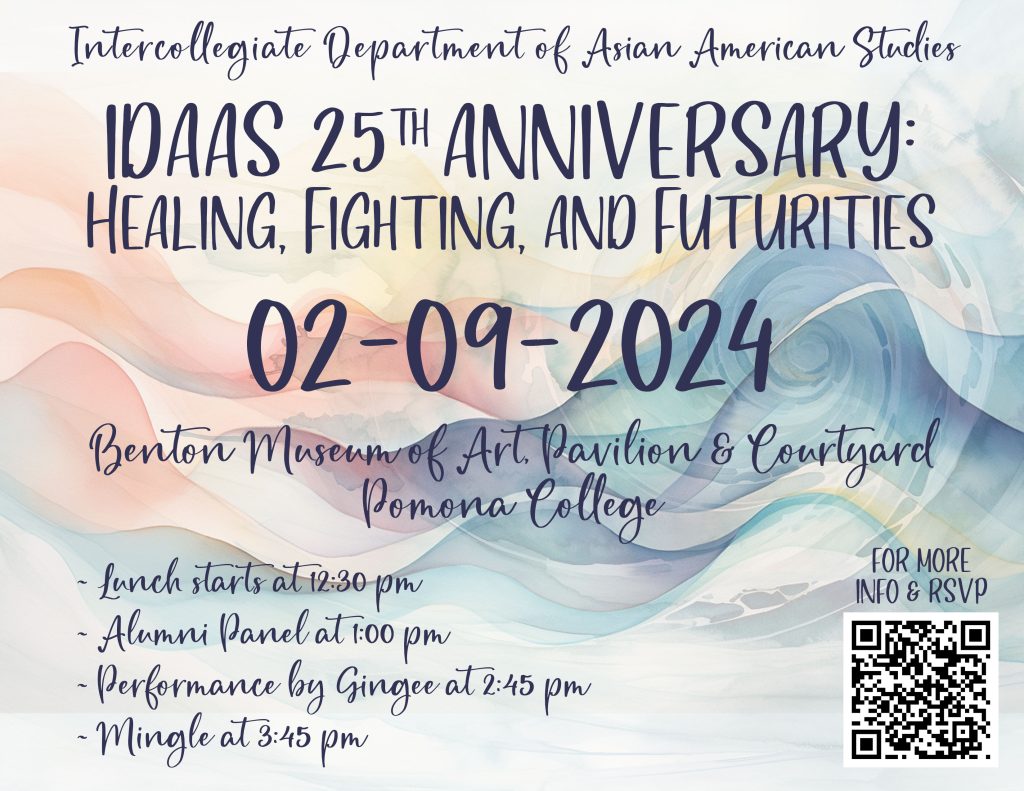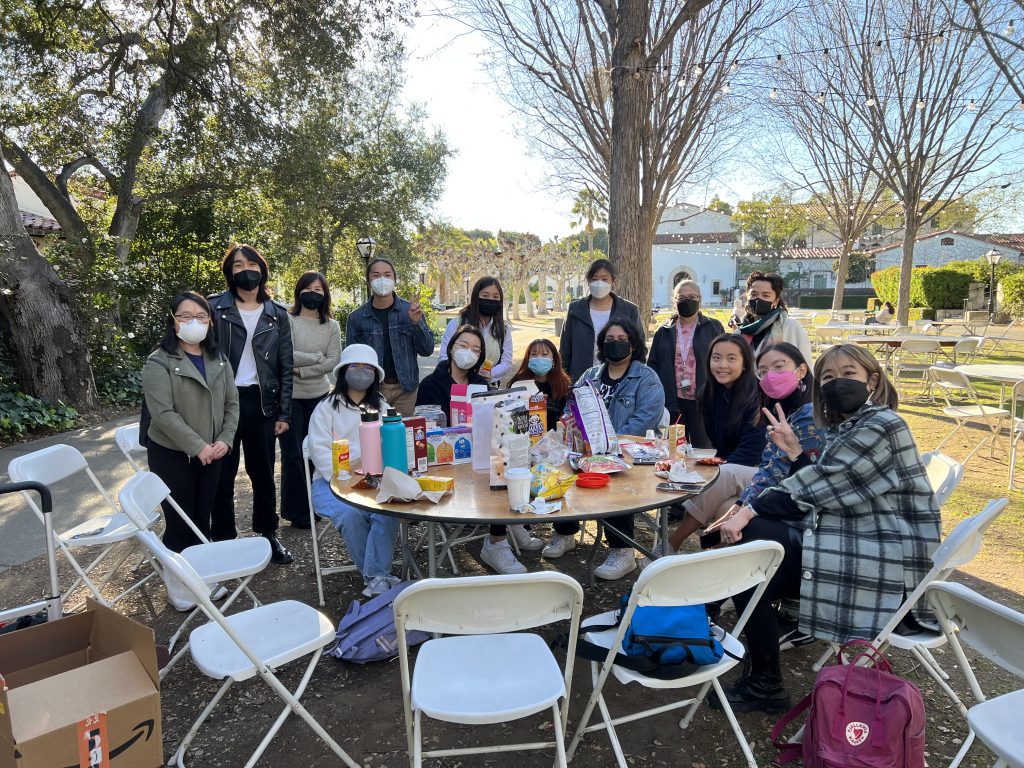11/2/2023
The Intercollegiate Department of Asian American Studies (IDAAS) issues the following statement, which was passed on October 30, 2023 by a majority vote.
We, the core faculty of the Intercollegiate Department of Asian American Studies (IDAAS) at the Claremont Colleges, are in solidarity with the people of Gaza and those among our Claremont College community who are affected by the current humanitarian crisis. We recognize the long struggle for self-determination of the Palestinian people, call for an immediate ceasefire, and demand an end to Israel’s occupation of Palestine. We acknowledge the originary role that student activism played in the formation of Asian American Studies as a field, and we call for the unconditional support and protection of student activism.
We denounce the Israeli state’s ongoing escalation of settler colonial violence, especially its illegal siege of Gaza backed by United States economic and military aid and political support. We register our dissent against this aggression as scholars who are affiliated with institutions located on occupied lands on Turtle Island (the United States), specifically the unceded territory of Tovaangar. We join Muslim, Jewish, SWANA, and Palestinian communities around the world calling for an end to the genocide of Palestinians in Gaza. We recognize the United Nations resolution calling for an immediate ceasefire and sustained “humanitarian truce.” We echo the call for the return of substantive humanitarian aid and life-sustaining resources to Gaza.
We are outraged by the Israeli state’s indiscriminate bombing of Gaza, the brutalization of its residents, its decision to cut off all power, water, internet and mobile services, and humanitarian aid to the 2.2 million residents of Gaza, and the media blackout that obscures evidence of ongoing human rights violations. We affirm the basic human rights to water, food, dignity, safety, and freedom. We denounce the targeting of schools, hospitals, first responders, journalists, and routes for safe passage to level Gaza’s infrastructure. We call for the U.S. government to withdraw military, financial, and political support for apartheid in Israel.
As Asian American Studies scholars, we locate the activist foundation of our field within the 1960s Third World Liberation Movements. We invoke and draw inspiration from the San Francisco State Strikes and movements such as the Organization of Arab Students (OAS), which in the aftermath of the 1967 Arab-Israeli War and the Naksa sought to link the struggle against the Zionist annexation and occupation of Palestine to anti-colonial, anti-imperial, and antiracist struggles across the Third World and in Muslim, Asian, Black, and Latine diasporas in the United States.
We acknowledge the foundational contribution of Palestinian American intellectual Edward Said’s Orientalism to Asian American Studies and the historical continuities between Palestinian liberation and Asian American social movements. Junaid Rana and Diane C. Fujino quote Said to point out “the unmistakable coincidence between the experiences of Arab Palestinians at the hands of Zionism and the experiences of those black, yellow, and brown people who were described as inferior and subhuman by nineteenth century imperialists.” We honor Said’s scholar-activist legacy through our commitment to working in solidarity with ongoing struggles for decolonization, abolition, and Indigenous self-determination and sovereignty.
We amplify the work of our professional organization, the Association for Asian American Studies (AAAS), the first academic organization outside Southwest Asia and North Africa (SWANA) to pass a resolution in support of the boycott of Israeli academic institutions: “to advance a critique of U.S. empire, opposing US military occupation in the [SWANA region] and U.S. support for occupation and racist practices by the Israeli state.” We highlight the insights of past AAAS President Rajini Srikanth, who calls our attention to “the intersections among the violation of Palestinian rights, U.S. Cold War interventions and military occupations in Asia, Japanese American internment, and settler colonialism in Hawai‘i.”
We recognize the entangled histories of U.S. imperialism, militarism, and wars across South/East Asia, SWANA, and the Pacific Islands that continue to affect our communities both in the United States and globally. We oppose the expansion of U.S. militarization across Asia, Oceania, the Indo-Pacific, the US-Mexico border, and beyond, which US President Joe Biden has folded into his proposed aid to Israel and outlined in his “Calls on Congress to Advance Critical National Security Priorities” on October 20, 2023. We are committed to creating collaborative and communal spaces for critical dialogue to engage these histories and continuities of anti-Asian violence.
We insist that administrations across the Claremont Colleges commit to the following actions:
- Denounce censorship, harassment, intimidation, and repression of any kind, especially those targeting Palestinian, SWANA, and Muslim students as they exercise their right to free speech, academic freedom, activism, and dissent.
- Denounce the targeting of students, staff, and faculty for their political beliefs, including support for the boycott, divestment and sanctions (BDS) movement to dismantle Israeli apartheid.
- Guarantee that no retaliatory action will be taken against students, staff, and faculty who choose to exercise their rights of freedom of speech and freedom of assembly.
- Institute restorative justice practices (i.e., repairing harm and restoring relationships) when holding accountable offenders that target, alienate and intimidate Palestinian, SWANA, Muslim as well as other students, faculty, staff, and alumni.
- Reject the use of language that dehumanizes and erases the suffering of Palestinian peoples.
- Reject the use of “terrorism” to describe Palestine solidarity and refuse the framing of anti-Zionism as antisemitism.
- Uplift the work of and protect Palestine studies scholars, and commit to establishing an Arab American studies curriculum across the consortium.


